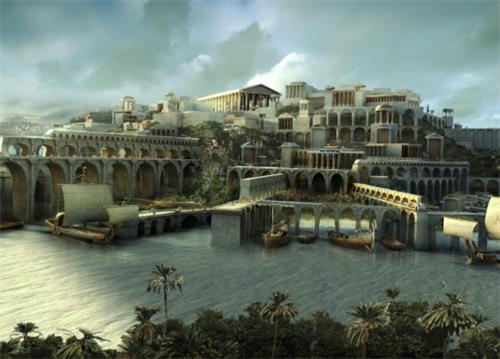
Atlantis, one of the most famous lost civilizations in the world, continues to hold an important place in the research of historians, archaeologists, and mythologists. The debate about Atlantis has persisted for centuries, especially concerning whether it was a real place or just a myth passed down through generations. Despite significant advances in modern science and technology, there are still many unknowns, especially when it comes to the lost city of Atlantis, which remains one of the most intriguing mysteries.
The Origins of Atlantis:
In his two dialogues, Timaeus and Critias, Plato provides a detailed description of the legend of Atlantis. Through these writings, Plato described an ancient and highly advanced civilization—Atlantis. The civilization was known for its advanced technology and culture. Plato mentioned that the fall of Atlantis occurred about 10,000 years ago, and due to the limitations of technology at the time, no conclusive remains or evidence have been found to prove its existence.
Although the story of Atlantis was first mentioned by Plato, no archaeological evidence has yet confirmed the real existence of Atlantis. Over time, Atlantis became the focus of numerous theories and hypotheses. Some scholars believe Atlantis may have been located in the Mediterranean near the coast of Spain, while a few speculate that its disappearance could have occurred in the distant South Pole.
The Society and Civilization of Atlantis:
According to Plato’s accounts, Poseidon and his wife had ten sons, each of whom inherited one of the ten regions of Atlantis. The eldest son, Atlas, was regarded as the king of kings, and the continent was named after him—Atlantis. The civilization of this kingdom was famous for its advanced technology and abundant resources. Abundant in gold and silver, the island’s grand palace walls reflected the sophistication of its advanced civilization. Additionally, Atlantis had numerous advanced shipyards and engaged in frequent trade with merchants from all over the world. At its peak, Atlantis was highly renowned, and its civilization had reached an extraordinary level of development.
However, this strength and prosperity did not last long. As Atlantis’s rulers descended into corruption and decadence, the kingdom began to crumble. Plato’s Critias notes that the island once plotted war against Athens, but instead it was overwhelmed by catastrophic floods and earthquakes. In a single night, the entire continent sank beneath the ocean, and the civilization of Atlantis disappeared.
The Disappearance of Atlantis:
According to Plato’s narrative, the destruction of Atlantis was caused by a series of natural disasters. This event became one of history’s greatest mysteries. Even with the rapid advancement of science and technology, no evidence has been found to prove the real existence of Atlantis, nor can the exact cause of its disappearance be explained.
While no archaeological discoveries have directly proven Atlantis’s existence, the legend continues to spark widespread interest and discussion worldwide. Some scholars believe that the story of Atlantis may be based on a real ancient civilization, which, after multiple reinterpretations, evolved into the version we know today. However, other experts suggest that Plato’s account might not be factual, but rather an allegory designed to warn people about the consequences of greed and corruption.

Storks,Klepetan,Malena
When Love Crosses 16,000 Kilometers: The Devoted Wait of Storks Klepetan and Malena
In a quiet village in Croatia, a love story beyond human language unfolded. In 1993, an elderly man accidentally took in an injured stork.

astronomy,ancient
How did the ancients observe the sky at night more than 500 years ago?
Over 500 years ago, the Chinese established the Ancient Observatory in Beijing, marking the beginning of long-term celestial observations.

Mara,Roy
From Expectation to Letting Go: An Irrevocable Tragic Love
Amid the turbulent changes of the 20th century, there was a poignant love story—like a radiant pearl, yet as fleeting and painful as a meteor over the sea.


